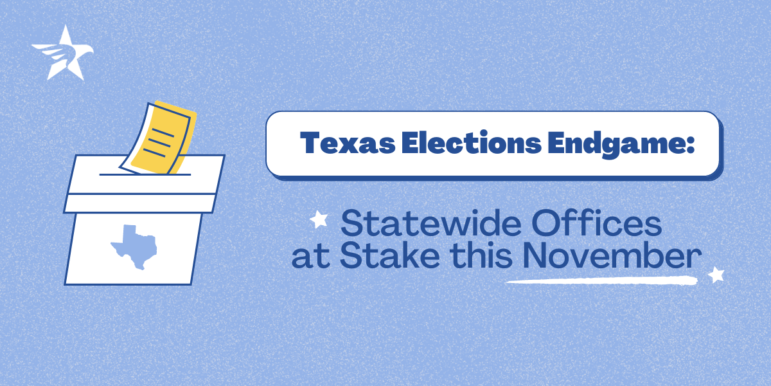In just a little over a month, Texans will decide our futures by casting ballots for our preferred candidates in four statewide races. Below, we dive briefly into the role of these offices, highlighting their constitutional duties and responsibilities as well as identifying candidates for each office.
First, here are some key dates to know: The voter registration deadline is October 11! Early voting begins on October 24 and lasts until November 4. Election Day is November 8. Learn how you can be a voter in 2022!
- Governor — the chief executive of the state. He/she/they make policy recommendations that lawmakers in the state House and Senate may sponsor and introduce as bills that can become law. As chief executive, the governor can sign or veto any bills passed by the Legislature. The governor appoints the Secretary of State, the members of important statewide boards (like the State Board of Education), and people who oversee state agencies and departments. The governor also has constitutional powers to convene special sessions of the Legislature for specific purposes, decide state taxes, recommend yearly budgets, declare special elections to fill vacancies in certain elected offices, as well as grant reprieves, and reduce sentences upon recommendation by the Texas Board of Pardons and Paroles.
Who will I see on the ballot for governor in November?
- Lieutenant Governor — the officeholder acts as a standby chief executive. Constitutionally, the lieutenant governor becomes acting governor when the governor is out of state. He/she/they can succeed the governor in case of prolonged vacancy. In their role, the lieutenant also serves as president of the Senate, in which they hold a deciding vote in tied situations. As a member of the Legislative Redistricting Board, the lieutenant governor is involved in redistricting House and Senate seats after every national census. Redistricting is the way we change the districts that determine who represents us and the needs of our communities. The lieutenant governor can also appoint members to more than 70 state boards and commissions while serving as a joint chair of multiple legislative committees.
Who will I see on the ballot for lieutenant governor in November?
- Attorney General — the AG is constitutionally empowered to defend Texas and its duly enacted laws, acting as the legal representative to the state, its officials, and agencies. He/she/they protect Texans by enforcing the state’s child support laws and collecting child support on behalf of Texas families. They investigate and prosecute criminal activities while safeguarding the freedoms of Texans as guaranteed by the US Constitution. The AG advises the governor, state agencies, and other officials on legal matters. The officeholder is also responsible for defending challenges to state laws and bringing lawsuits against federal laws. While the AG has broad prosecutorial powers, in many cases this office relies on formal requests from prosecutors to initiate criminal prosecution.
Who will I see on the ballot for AG in November?
- Railroad Commissioner — the railroad commission of Texas is primarily responsible for regulating the oil and gas industry, pipeline transporters, natural gas, and hazardous liquid pipeline industry, natural gas utilities, as well as coal and uranium surface mining operations. There are two commissioners, each elected to six-year, staggered terms. This means at least one commissioner position is on the ballot every two years. These commissioners appoint a chairman and together these three people comprise the railroad commission. The commissioners set monthly production quotas, issue oil and gas drilling permits, and schedule inspections of oil wells and facilities.
Who will I see on the ballot for railroad commissioner in November?
Wayne Christian – (R, Incumbent)
- Agriculture Commissioner — the agriculture commissioner leads the department that protects consumers in Texas by regulating all weights and measuring devices, such as grocery store scales and retail price scanners. The agency manages the National School Lunch and Breakfast programs for Texas school children. It also provides financial assistance to farmers and ranchers, as well as administer grants for agricultural research. This office has increasingly become important as Texas copes with the impact of droughts and wildfires on the food supply chain.
Who will I see on the ballot for agriculture commissioner in November?
Sid Miller (R, Incumbent)
- Land Commissioner — as the oldest state agency in Texas, the general land office manages state lands, operates the Alamo, supports Texans recovering from natural disasters, helps fund Texas public education through the Permanent School Fund, provides benefits to Texas veterans, and manages the Texas coast. The commissioner serves a four-year term.
Who will I see on the ballot for land commissioner in November?
Dawn Buckingham (R, Incumbent)
- Comptroller — the comptroller serves as the state’s chief tax collector, accountant, revenue estimator, treasurer and purchasing manager. State agencies depend on the comptroller’s office to pay their bills and issue paychecks to state employees. The comptroller guides the legislature as it charts the course of the Texas economy by producing annual financial reports and estimating future state revenues. Texans rely on this officeholder to safeguard their tax dollars and ensure it is spent wisely. The comptroller also awards and manages statewide contracts on behalf of state agencies.
Who will I see on the ballot for comptroller in November?
Glenn Hegar (R, Incumbent)
V. Alonzo Echevarria-Garza (L)


